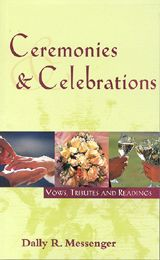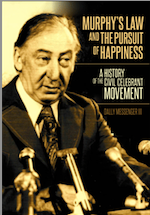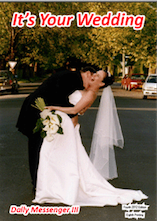John Hill, leading celebrant, explains the injustice of the ACCC's actions against Dally Messenger III
Funeral Directors effectively set fees for Funeral Celebrants - they always have.
ACCC and Messenger: Table of Contents
Letter to celebrants and friends appealing for funds for Dally Messenger III. From John Hill, former Committee Member -Australian Federation of Civil Celebrants
Dear Colleague Celebrant,
Let me introduce myself
I am a friend of Dally’s and worked closely with him, Kathleen Hurley and others in the development of the Australian Federation of Civil Celebrants Inc (AFCC) and the International College of Celebrancy during the mid and late 1990s. The committee at the time did substantial work in improving standards of ceremonies and the profile of celebrancy.Some of you are familiar with the circumstances of this appeal and understand the issues. If so, you need read no further! But now is the time to donate. Details of the legal Fundraiser, Stan Jordan CPA, are at the end of this letter. I urge you to give as generously as possible. Dally Messenger is up for $40,000 in fines, $6000 in costs, and $18,600 in legal fees. Every contribution is gratefully received and will be acknowledged by Dally and Remi Messenger personally.
--
The Fixed Fee in Weddings and Funerals.
From its beginnings in 1973, the celebrant movement inherited a fixed fee culture. The fee for weddings was fixed by the Federal Government until 1995. The fee for funerals has always been fixed by agreement between the Funeral Directors (FD) and the clergy. Celebrants inherited this culture.
Because of the extra time celebrants need to prepare personal Funeral ceremonies, and because, unlike the clergy, they are not supported by a congregation, celebrants asked for a fairer fee. Throughout most of Australia the Funeral Directors resisted. In Victoria a few recognised the fairness of the claim, and paid civil celebrants a higher fee – but insisted (and still insist) that it had to be fixed for all Funeral Directors across the board.
--
Periodic rises in fees from the Funeral Directors
Over the years, funeral celebrants in Victoria have asked the Funeral Directors for a rise in fees, especially when their fee had been eaten away by inflation – but with mixed success. Individual celebrants who set their own fee simply received no work. The public goes to the Funeral Director.
--
Enter the Australian Competition and Consumer Commission (ACCC)
In 1997 when Dally was AFCC Administrator (and I was active on the committee supporting him), the Federation received phone calls and letters from the ACCC. Dally explained to the official that the control of fees was, and always had been, in the control of the Funeral Directors. If they had a difficulty with the fixed fee, they should go to the FDs.
He wrote telling the ACCC that they should inform the FDs and the Churches to change their practice. Nevertheless, they advised Dally to arrange for a clarification in the AFCC’s constitution with the following words: “The celebrant should individually determine the fees to be charged for his or her services. In doing so, he or she may wish to consult the fee scale recommended by the Association.”
Dally did exactly what the ACCC recommended – indeed these words have remained in the AFCC’s constitution (most Funeral Celebrants are members) and in the College of Celebrancy’s constitution. They have been on the College’s website for years before the present problems, and are there still.
--
Telephone the Celebrant First campaign.
In 1997 Dally personally decided to set his own hourly rate and urged his fellow celebrants to do so. He suggested bypassing the Funeral Director and communicating with the individual celebrant’s client base. In a sense by doing so he was the only celebrant engaging in competition. It appears that he may have been blacklisted since, in ten years, he never received from the FDs one funeral at his hourly rate.
--
The Rest is History
At a Best Practice Funerals Conference in October 2005, Dally, against his better judgment, wrote again to the Victorian FDs. The letter had two parts: one, asking the FDs to raise their fixed ceiling fee, the second part contained his own request that they consider those celebrants who charge the hourly rate.
We believe that the ACCC received an anonymous letter accusing Dally of violating the Act by uncompetitive behaviour. Without even interviewing Dally or finding out the true circumstances, or any kind of committal hearing, the ACCC issued civil proceedings against him in the Federal Court. More detail is available by reading the excellent article by author and legal practitioner Moira Rayner on this link. It is a must read. Other background material is available at these links Link 1, Link 2. Also there is a key quotation from the transcript of the the court proceedings.
--
Injustice
The “Mediation” arranged by Dally’s lawyers was considered “successful” because the amounts at the Federal Court level are usually in hundreds of thousands of dollars. But to someone like Dally (or you and me!), the penalty is unbalanced and out of proportion to the alleged “offence”. Even the ACCC barrister stated to the judge that Dally did not stand to gain any benefit from his letter.
--
The future of Celebrancy
Dally is firmly of the belief, and so am I, that Funeral Celebrancy is central to the celebrant’s role in our society. Educated skilled funeral celebrants should be the norm instead of the exception. However good training is scarce and the scene is over-competitive. This inevitably leads to cheap prices for ceremonies of low standard. High standard celebrants need access to Funerals, in such a way, that they could be paid according to effort and ability. This would give many celebrants meaningful work, more comfort to grieving families, and enrich Australian cultural life.
--
Leadership and gratitude
As for Dally himself, I have given my opinion of him in a personal letter to Mr Graeme Samuel of the ACCC. In short I have found him wonderfully generous and creative in his efforts on behalf of others. He has made a unique and incomparable contribution to the celebrant movement. In doing so, he has also contributed to creating a more humane, decent and hope-filled society. I agree with others who say that there is not a celebrant in Australia who has not benefited in some way by Dally Messenger’s work over the years. In incurring this penalty, it is universally acknowledged that Dally was acting for the betterment of all celebrants. This penalty is unjust. I urge you to give generously.
John Hill
Ceremonies - all |
History |
Marriage Ceremonies |
---=
